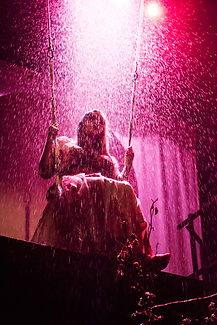


HISTORY
THE MARLOWE SOCIETY WAS FOUNDED IN MAY TERM 1907 BY A GROUP OF STUDENTS INCLUDING JUSTIN BROOKE. IT BECAME FAMOUS THEN BECAUSE IT WAS A REACTION AGAINST VICTORIAN THEATRE AND TRADITION, REVIVING THE PRESENTATION OF SHAKESPEARE IN CAMBRIDGE WHICH HAD NOT BEEN PERFORMED SINCE 1886, AND IMPORTANTLY RAISING THE STANDARD OF VERSE-SPEAKING BY ACTORS. OVER THE YEARS, IT HAS ACTED AS A NURSERY OF TALENT AND REFORM.
NOTABLE PRODUCTIONS INCLUDE A DUCHESS OF MALFI IN 1942 WHICH INDUCED PEGGY ASHCROFT TO TAKE THE PART IN THE WEST END, ; A WHITE DEVIL AND MEASURE FOR MEASURE WHICH WENT TO BERLIN IN 1948 IN THE AIR-LIFT AS THE FOREIGN OFFICE’S CULTURAL COUNTER-ATTACK TO THE RED ARMY CHOIR; JOHN BARTON’S JULIUS CAESAR OF 1952 WHICH WAS ACTED WITH ELIZABETHAN PRONUNCIATION; A ROMEO AND JULIET WITH BARTON AS MERCUTIO AND PETER HALL AS TYBALT WHICH TRANSFERRED TO THE SCALA, WHERE IT WAS SEEN BY WINSTON CHURCHILL; BARTON’S TWO PARTS OF HENRY IV WITH MCKELLEN, JACOBI AND A NOTABLE FALSTAFF BY CLIVE SWIFT; THE 1958 EDWARD II WITH JACOBI DIRECTED BY TOBY ROBERTSON, WHICH WAS BROADCAST BY THE BBC; CORIN REDGRAVE’S PRODUCTION OF HENRY VI; TREVOR NUNN’S MACBETH (1962), WHICH TRANSFERRED TO A GIANT THEATRE IN NEWCASTLE; GRIFF RHYS JONES’S RUMBUSTIOUS PRODUCTION OF BARTHOLOMEW FAIR (1977); AND SAM MENDES’S MEMORABLE CYRANO OF 1988 STARRING TOM HOLLANDER.
IN THE 1950S THE MARLOWE SOCIETY’S ACHIEVEMENTS WERE RECOGNISED BY THE BRITISH COUNCIL WHICH COMMISSIONED US TO RECORD THE COMPLETE, UNCUT CANON OF SHAKESPEARE POEMS AND PLAYS, UNDER THE DIRECTION OF GEORGE RYLANDS, IN TIME FOR THE CENTENNIAL OF 1964. THE OBSERVER DESCRIBED THE RECORDINGS AS “THE MOST IMPORTANT THING THAT HAS HAPPENED TO [SHAKESPEARE'S] WORK SINCE HEMINGES AND CONDELL SAW IT THROUGH THE PRESS.” THESE RECORDINGS WERE DISTRIBUTED AROUND THE WORLD.
OVER THE YEARS OUR SOCIETY HAS FOUND AN INTEREST IN DRAMA THAT STRETCHES BEYOND ORDINARY REALISM AND TOWARDS THE CHALLENGING AND IMAGINATIVE. SOMETHING DERIVING DIRECTLY FROM PERFORMING AT THE CAMBRIDGE ARTS THEATRE SINCE 1936 HAS BEEN THE INTRODUCTION OF A PROFESSIONAL DIMENSION TO STUDENT THEATRE AT CAMBRIDGE. THE STIMULUS OF THIS LAST HAS PERHAPS BEEN THE SINGLE MOST IMPORTANT EXPLANATION FOR THE PHENOMENAL SUCCESS OF CAMBRIDGE ACTORS AND DIRECTORS IN BRITISH THEATRE.
THE NEW CENTURY HAS BROUGHT WITH IT NEW STRANDS, IN THE FORM OF THE PROMOTION OF NEW WRITING. MEANWHILE, THE MARLOWE CONTINUES WORKING TO CONTINUE THOSE TRADITIONS ESTABLISHED DECADES AGO – IN 2007 THE SOCIETY CELEBRATED ITS CENTENARY WITH A DINNER AUCTION HOSTED BY GRIFF RHYS-JONES IN WILTON’S MUSIC HALL AND A PRODUCTION OF CYMBELINE BY TREVOR NUNN IN CAMBRIDGE ARTS THEATRE.
IN 2013 WE EMBARKED UPON ONE OF OUR MOST ADVENTUROUS PROJECTS YET WITH THE MARLOWE FESTIVAL, A YEAR-LONG CELEBRATION OF MARLOWE'S 450TH BIRTHDAY. FROM MICHAEL OAKLEY'S DIDO, QUEEN OF CARTHAGE AT THE SENATE HOUSE TO DREW MULLIGAN'S DOCTOR FAUSTUS AT THE CAMBRIDGE ARTS THEATRE, WE STAGED EVERY CHRISTOPHER MARLOWE PLAY ACROSS CAMBRIDGE, ALONG WITH READINGS OF MARLOWE'S POETRY. IN 2015 WE MARKED THE 600TH ANNIVERSARY OF THE BATTLE OF AGINCOURT WITH A PRODUCTION OF HENRY V IN THE CAMBRIDGE ARTS THEATRE, DIRECTED BY LISA BLAIR.
FOR THOSE INTERESTED IN THE HISTORY OF THE MARLOWE, AND THE INFLUENCE IT HAS HAD ON BRITISH THEATRE IN GENERAL, TIM CRIBB, THE CHAIR OF OUR SOCIETY, HAS PUBLISHED THE BOOK BLOOMSBURY AND BRITISH THEATRE.
YOU CAN BUY THE BOOK ONLINE HERE OR HERE.


